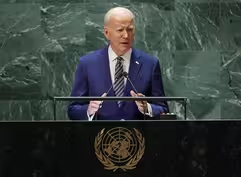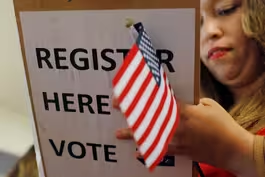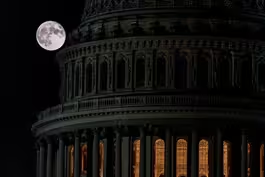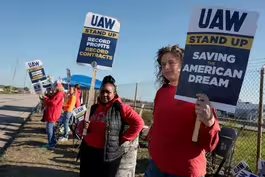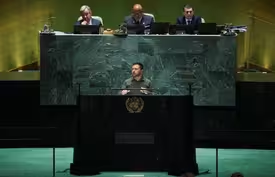
Why 'ghost gear' is being removed from the Gulf of Maine
Clip: 9/19/2023 | 8m 14sVideo has Closed Captions
'Ghost gear' piles up in the Gulf of Maine amid plastic onslaught on oceans
Abandoned fishing gear, often called "ghost gear," is breaking down in our oceans and adding to the problems brought by plastics and microplastics. But there was a recent effort to get the United Nations to enforce tougher regulations, and a coalition announced new funding to remove some debris in the Gulf of Maine. Science correspondent Miles O'Brien reports.
Problems playing video? | Closed Captioning Feedback
Problems playing video? | Closed Captioning Feedback
Major corporate funding for the PBS News Hour is provided by BDO, BNSF, Consumer Cellular, American Cruise Lines, and Raymond James. Funding for the PBS NewsHour Weekend is provided by...

Why 'ghost gear' is being removed from the Gulf of Maine
Clip: 9/19/2023 | 8m 14sVideo has Closed Captions
Abandoned fishing gear, often called "ghost gear," is breaking down in our oceans and adding to the problems brought by plastics and microplastics. But there was a recent effort to get the United Nations to enforce tougher regulations, and a coalition announced new funding to remove some debris in the Gulf of Maine. Science correspondent Miles O'Brien reports.
Problems playing video? | Closed Captioning Feedback
How to Watch PBS News Hour
PBS News Hour is available to stream on pbs.org and the free PBS App, available on iPhone, Apple TV, Android TV, Android smartphones, Amazon Fire TV, Amazon Fire Tablet, Roku, Samsung Smart TV, and Vizio.
Providing Support for PBS.org
Learn Moreabout PBS online sponsorshipGEOFF BENNETT: We have often talked about the enormous problem of plastics and microplastics in our oceans.
One important contributor is lost or abandoned fishing gear that breaks down, often referred to as ghost gear.
The issue is getting more attention.
There was a recent effort to get the United Nations to enforce tougher regulations as part of an international treaty.
And, just last week, a coalition announced new funding to remove some debris in the Gulf of Maine.
But as science correspondent Miles O'Brien, there's a lot more work to be done.
MILES O'BRIEN: Hart Island is a tiny, rugged spit of land about a mile off the coast of Maine.
It is uninhabited, a natural refuge for seabirds.
But humans are spoiling the landscape with an unending tidal wave of lost, abandoned, and dumped fishing gear.
LINDA WELCH, U.S.
Fish and Wildlife Service: It's incredibly overwhelming, and the fact is, it just keeps coming.
Oh, it still has use of that.
It probably hasn't been trapped there very long.
MILES O'BRIEN: Linda Welch is a wildlife biologist for the U.S.
Fish and Wildlife Service.
It manages the Maine Coastal Islands National Wildlife Refuge, 73 islands that are home to thousands of nesting seabirds, some of them endangered or threatened.
LINDA WELCH: I don't think there's another industry that would be allowed that type of behavior, where trash from your industry accumulates on public lands and you have no responsibility to clean it up.
MILES O'BRIEN: Chicks instinctively seeking shelter from predators, crawl into washed-up lobster traps, confining them inside.
LINDA WELCH: It looks like it has a piece of the rope line in the trap wrapped around its foot, and it died because it wasn't able to get free from that marine debris.
MILES O'BRIEN: The tangled, mangled traps weigh at least 50 pounds a piece, and the refuge islands have no harbors, docks, or boat ramps.
LINDA WELCH: And so we have to come ashore in small skiffs, hand-carry the traps into those boats.
Those boats shuttle the gear to offshore larger boats, and then those boats transport it back to the mainland.
It's incredibly time-consuming.
MILES O'BRIEN: The cleanup is largely left to volunteers coordinated by nonprofits.
LAURA LUDWIG, Center for Coastal Studies: Man, you get an appreciation for how these frigging things are made.
MILES O'BRIEN: Laura Ludwig is manager of the marine debris and plastics program at the Center for Coastal Studies.
We caught up with her on a foggy morning on Cuttyhunk Island, Massachusetts.
LAURA LUDWIG: My gosh, it's like a spider web.
MILES O'BRIEN: After a long week of beachcombing by an army of volunteers, the heavy equipment and the barge had arrived to finish the job.
LAURA LUDWIG: At its peak, I believe there were 3.2 million trap tags sold annually.
That could be anywhere from 200,000 to 300,000 traps lost annually, annually.
MILES O'BRIEN: That's a pretty stunning number.
LAURA LUDWIG: It is.
It is.
MILES O'BRIEN: Lobsterman Steve Train has been fishing in the Gulf of Maine for more than 40 years.
STEVE TRAIN, Lobsterman: Last year we had quite a few storms, and I lost 30 traps, and that was like a record for me.
MILES O'BRIEN: The climate emergency will likely worsen that problem, but it's not the only reason traps go missing.
STEVE TRAIN: Boats cut them off.
Ships cut them off.
But it's not trash.
It's not stuff that just got thrown away.
MILES O'BRIEN: There aren't fishermen under cover of night going out and dumping old nets and traps in the water because they don't want to deal with it?
STEVE TRAIN: Oh, do I think that might happen?
Probably, but is that the industry norm?
No.
That's not what we do.
MILES O'BRIEN: Right about the time Train began fishing, the industry started using steel traps coated with plastic and plastic lines.
They replaced wood and sisal, which degrade naturally.
This gear does not.
It lasts forever.
For Buzz Scott, the bigger problem is out of sight, but not out of mind.
BUZZ SCOTT, OceansWide: You clear?
MILES O'BRIEN: Traps that pile up on the seafloor, so-called ghost gear.
BUZZ SCOTT: They're ghost gear because we have lost them.
They're gone.
They're ghosts to us.
But they also are ghost gear because those traps are still fishing.
If they catch one animal a year that is eaten by another animal that's in that trap, we're wasting a lot of resources.
MILES O'BRIEN: Scott is founder and president of OceansWide, a nonprofit that educates students about the Gulf of Maine.
His dismay over the huge mess that lies beneath the surface has led to some action.
Over the past three years, he and his team have removed about 3,600 lost traps from the bottom of Boothbay Harbor.
BUZZ SCOTT: We could have 100 divers, 20 boats, and five ROVs working in the Gulf of Maine constantly.
It's taken 40 years to fill the ocean up, so it will take us a lot longer to find all these traps.
MILES O'BRIEN: Of course, the problem is not limited to lobster traps in the Gulf of Maine.
All over the planet, the seas are littered with abandoned nets, lines, buoys, and traps, death traps for all kinds of marine life, like these desperate crabs.
INGRID GISKES, Ocean Conservancy: Fishing gear is the most harmful form of plastic marine debris in the ocean.
MILES O'BRIEN: Ingrid Giskes is with the Ocean Conservancy.
It is seeking solutions to this burgeoning problem, part of the plastic onslaught on the oceans.
So, pound for pound, is this more lethal for marine life?
INGRID GISKES: Marine animals can get entangled in ghost gear.
They can ingest it.
It can break down.
And the reason for that is, is because fishing gear can be incredibly light and float within the water column, where often the marine animals live and play.
MILES O'BRIEN: The nonprofit leads the Global Ghost Gear Initiative, fostering recycling projects that lead to consumer products.
They have partnered with a company called Bureo to make clothing, sunglasses and skateboards out of fishing nets.
But recycling any kind of plastic is problematic, and the massive nets and heavy traps present an even greater challenge.
Most fishing ports do not even have a place for fishermen to recycle their old gear.
CAITLIN TOWNSEND, Net Your Problem: So, all of the gear that I have here comes from different fishermen in Massachusetts.
MILES O'BRIEN: Caitlin Townsend works for a nonprofit called Net Your Problem, also trying to make it easier for fishermen to recycle their plastic gear.
She works mostly alone, with her dog, in a warehouse near the most lucrative fishing port in the U.S., New Bedford, Massachusetts.
CAITLIN TOWNSEND: I take these nets and I will lay it out.
And, essentially, I will go through and separate it out into all the different types of plastic.
MILES O'BRIEN: Net Your Problem has recycling sites in Alaska, Washington state, California and Maine, as well as this one.
What's the big solution, in your view?
CAITLIN TOWNSEND: In my view, it would be to have an operation like this in every major fishing port in the United States.
MILES O'BRIEN: But she has to send the sorted plastic to Europe, because there are no recycling facilities here that will accept it.
Back down east, Buzz Scott employs a hydraulic crusher to make it easier to recycle the lobster traps.
To get them melted down, he must truck them across the border into Canada.
About a month after our visit to Hart Island, Linda Welch led a cleanup effort.
Volunteers gathered and crushed more than 200 traps.
A chartered barge is set to haul it all away.
But the derelict fishing gear just keeps coming.
For the "PBS NewsHour," I'm Miles O'Brien along the Gulf of Maine.
Biden calls out Russia for its war in Ukraine in UN speech
Video has Closed Captions
Clip: 9/19/2023 | 3m 54s | Biden calls on world leaders to promote peace and stand with Ukraine against Russia (3m 54s)
Groundbreaking educator recounts her life in a new memoir
Video has Closed Captions
Clip: 9/19/2023 | 7m 42s | Groundbreaking educator recounts remarkable life in a new memoir (7m 42s)
New state and local efforts try get more people to vote
Video has Closed Captions
Clip: 9/19/2023 | 6m 19s | How new state and local efforts are trying to register more people to vote (6m 19s)
Rep. Ralph Norman discusses the looming government shutdown
Video has Closed Captions
Clip: 9/19/2023 | 11m 38s | Republican Rep. Ralph Norman discusses negotiations to avoid a government shutdown (11m 38s)
UAW strike stretches on amid warnings of more shutdowns
Video has Closed Captions
Clip: 9/19/2023 | 6m 8s | UAW strike stretches on amid warnings of more factory shutdowns (6m 8s)
Zelenskyy addresses UN in push to expand support for Ukraine
Video has Closed Captions
Clip: 9/19/2023 | 3m 52s | Zelenskyy addresses UN in push to expand support for Ukraine (3m 52s)
Providing Support for PBS.org
Learn Moreabout PBS online sponsorship
- News and Public Affairs

FRONTLINE is investigative journalism that questions, explains and changes our world.

- News and Public Affairs

Amanpour and Company features conversations with leaders and decision makers.












Support for PBS provided by:
Major corporate funding for the PBS News Hour is provided by BDO, BNSF, Consumer Cellular, American Cruise Lines, and Raymond James. Funding for the PBS NewsHour Weekend is provided by...
